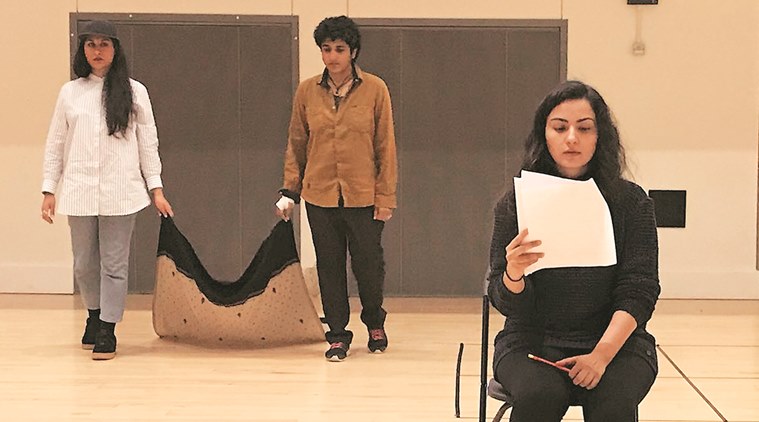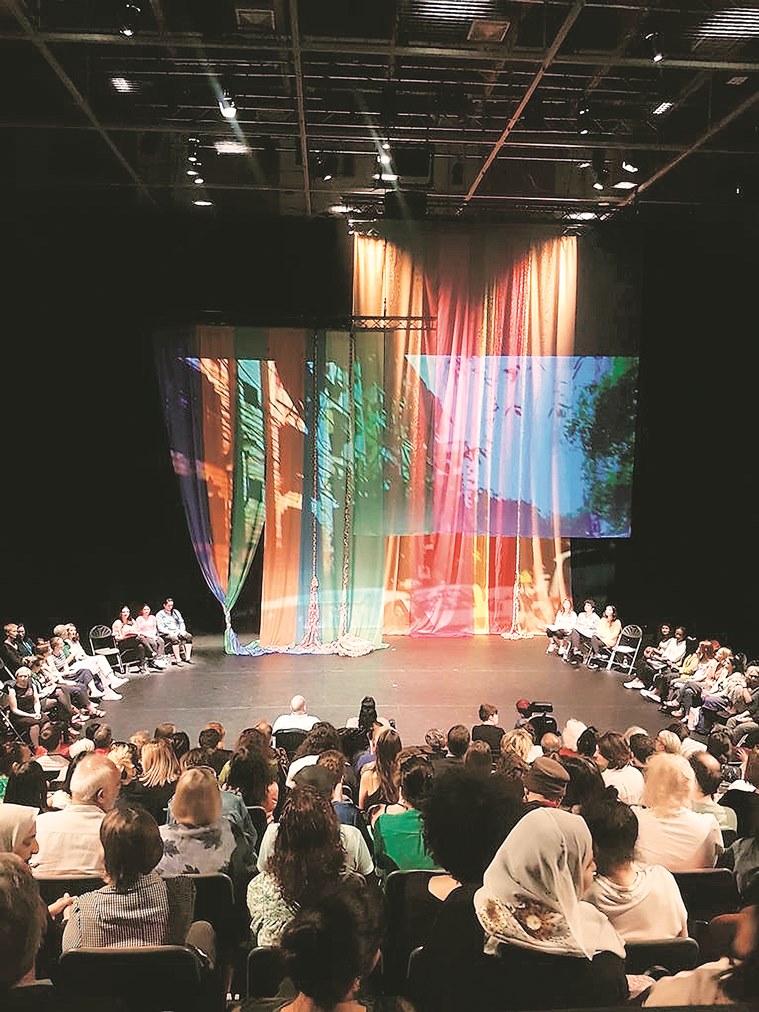The Stage is All Yours
Real stories of South Asian women in Wales and India, collected through an extensive R&D process, has led to a play, titled Sisters.

A scene from the development of the play. (Express)
Select 10 objects that represent you. Arrange and photograph them in a scene of your creation. Share the image. When Sameer Iyengar, co-founder and Director of Mumbai-based theatre organisation, Junoon, tackled this exercise in self-reflection, she made a startling discovery. All the things that made up her story were no longer around her. “Because I was travelling so much and had been all over the place, from West Bengal to the US, before coming to Mumbai, I hadn’t keep a lot with me,” she says, revealing a less-known facet of academic or economic migration. Iyengar ended up using a lot of photographs for the exercise to make up for the missing objects.
“A process like this is really interesting because it makes you look around and think,” she says. The exercise was a part of a research into the lives of contemporary South Asian women in India and Wales that was carried out over six months last year. The intent was to gain an insight into the question, “Who are we as South Asian women?” and the spectrum of participants included a chaiwali, a professor, a nurse in the army, artistes and government servants. The stories collected through interviews and exercises has led to a work-in-progress play, Sisters, which was staged at the Wales Millennium Centre in Cardiff in April.
The production, a collaboration between the National Theatre Wales and Junoon, is unique in being fed by one of the largest researches of its kind. The eight stories in the hour-long play are drawn from lived experiences that are complex, diverse and reflect similarities and differences in South Asian women. National Theatre Wales and Junoon are working on bringing the play to India. In separate interviews, Iyengar, who has also acted in Sisters, director Kully Thiarai, and one of the playwrights, Sapan Saran, speak about the process and the performance:
How did you pick the artistes who conducted the R&D in India?
Sameera Iyengar: We chose people who would be collaborative by nature, have a certain kind of sensibility and were connected to other places. Sushma Deshpande, who now lives in Mumbai, is originally from a village in Maharashtra and Choiti Ghosh goes back and forth between Delhi and Mumbai. As our work involves travel, we made it a point to interview people in the places we went. In the final performance, it was important for us not to encapsulate, not to give a consumable South Asian woman but to say, ‘these are South Asian women’ and cover a diversity of experiences and thoughts.
Sameera Iyengar: We chose people who would be collaborative by nature, have a certain kind of sensibility and were connected to other places. Sushma Deshpande, who now lives in Mumbai, is originally from a village in Maharashtra and Choiti Ghosh goes back and forth between Delhi and Mumbai. As our work involves travel, we made it a point to interview people in the places we went. In the final performance, it was important for us not to encapsulate, not to give a consumable South Asian woman but to say, ‘these are South Asian women’ and cover a diversity of experiences and thoughts.
What was the process of converting the data into a script?
Sapan Saran: The research material that was generated, represented the diverse voices, concerns, joys, doubts, victories and issues of the South Asian women today. The big question then was the creation of a script that can take on board all of this and create a play. Sudha (Bhuchar, the other playwright) and I responded to the research by writing pieces based on ideas that spoke to us as individual writers at first. That, then, led to a series of writings that organically suggested juxtapositions and counter points. The second step was to try and look at frameworks. During the final two weeks in Cardiff, the entire team, led by Kully, came together and responded to the written pieces through discussions and improvisations. Elimination was the last step.
Sapan Saran: The research material that was generated, represented the diverse voices, concerns, joys, doubts, victories and issues of the South Asian women today. The big question then was the creation of a script that can take on board all of this and create a play. Sudha (Bhuchar, the other playwright) and I responded to the research by writing pieces based on ideas that spoke to us as individual writers at first. That, then, led to a series of writings that organically suggested juxtapositions and counter points. The second step was to try and look at frameworks. During the final two weeks in Cardiff, the entire team, led by Kully, came together and responded to the written pieces through discussions and improvisations. Elimination was the last step.
How did you translate the script to a production?
Kully Thiarai: With Sisters as a ‘sharing’ to the public, I wanted to offer up as much of the material as I could — to honour the varied stories we had collected in India and the UK. So, the presentation was made up of a kaleidoscope of characters and stories, which ranged from young women growing up in Cardiff, Wales, to a Dalit writer in India. There was a lot of material to choose from. I wanted to respond to some of the themes they drew out but also didn’t want, at this stage, to make a piece that centred around a particular story or particular characters.
Kully Thiarai: With Sisters as a ‘sharing’ to the public, I wanted to offer up as much of the material as I could — to honour the varied stories we had collected in India and the UK. So, the presentation was made up of a kaleidoscope of characters and stories, which ranged from young women growing up in Cardiff, Wales, to a Dalit writer in India. There was a lot of material to choose from. I wanted to respond to some of the themes they drew out but also didn’t want, at this stage, to make a piece that centred around a particular story or particular characters.
Sameera Iyengar: There were a number of things Kully was very clear about. There were going to be no sets. The backdrop was of cloth that was dropped, some ropes and projections. There were minimal props because Kully didn’t want things being carried on and carried off because the point was to flow through the evening. What we worked on a lot was transitions and not only on the pieces but to think of which story should follow which. What story should come to ease the audience in and how do you take them to the highest point of intensity and then, how do you ease out of the performance again. We found very simple transitions, mostly through movement such as walking, dancing handing over from one person to another. Actors had four chairs on either side and, while we were not in the performance, we were on the chairs holding scripts. We were very clear that you should come out of the performance feeling that you have only heard some voices and there are so many more.
For all the latest Lifestyle News, download Indian Express App






















 The final production in Wales. (Express)
The final production in Wales. (Express)
No hay comentarios:
Publicar un comentario